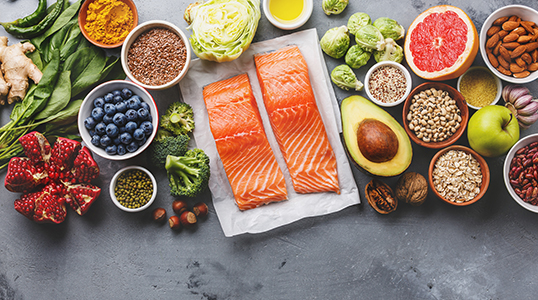 To solve the problem, find its cause – said in the context of health problems Dr. John Bergman, an outstanding doctor and researcher, specialist in holistic medicine, author of many scientific publications. Treating the symptoms of the disease alone may not be effective. The only right and proper direction is to identify and remove the root cause of the ailment. Dr. Bergman’s thesis can be used as an effective therapy for many health problems. Is it also possible in the case of polycystic ovary syndrome, a disorder with which, according to statistics, about 10-15% of women of reproductive age struggle with. So, let’s look for the primary sources of this disease and try to identify natural methods to treat it.
To solve the problem, find its cause – said in the context of health problems Dr. John Bergman, an outstanding doctor and researcher, specialist in holistic medicine, author of many scientific publications. Treating the symptoms of the disease alone may not be effective. The only right and proper direction is to identify and remove the root cause of the ailment. Dr. Bergman’s thesis can be used as an effective therapy for many health problems. Is it also possible in the case of polycystic ovary syndrome, a disorder with which, according to statistics, about 10-15% of women of reproductive age struggle with. So, let’s look for the primary sources of this disease and try to identify natural methods to treat it.
Polycystic ovary syndrome (PCOS) is an endocrine disorder that is the most common hormonal disorder in women of reproductive age and the most common cause of infertility. Menstrual cycles are generally anovulatory, making it impossible for a woman to become pregnant. Under the influence of hormones, the Graffian follicle grows, in which the egg cell matures, but it does not release. This repeated mechanism leads to changes in the ultrasound image of the ovaries, which shows many dead follicles.
The most common endocrine disorders associated with PCOS are increased levels of androgens (male sex hormones) and estrogens, increased insulin levels and insulin resistance, as well as a higher ratio of luteinizing hormone (LH) to follicle stimulating hormone (FSH). These changes may manifest as irregular or absent menstrual cycles (oligomenorrhea, amenorrhea) and infertility, mainly due to anovulation. The symptoms of PCOS also include acne and hirsutism, i.e., excessive male-pattern hair, occurring, for example, on the face or chest, caused by elevated levels of androgens. Polycystic ovary syndrome is associated with an increased risk of endometrial hyperplasia and endometrial cancer, diabetes type II and gestational diabetes, as well as obesity and hypertension.
Knowing the basic symptoms of the disease, let’s go back to the aforementioned quote by Dr. John Bergman and consider what may be the root cause of elevated levels of androgens and estrogens in patients and other hormonal disorders associated with PCOS. In one of the many scientific papers about this topic, published in 2011 in the Iranian Journal of Obstetrics, entitled “Comparison of the eating habits of women with polycystic ovary syndrome with the eating habits of healthy women”, we find information that excessive secretion of male sex hormones may be caused by high consumption of low-fat dairy products. There are also other studies confirming this thesis. The scientific paper by Chavarro et al., “A Prospective Study on the Impact of Dairy Consumption on Anovulatory Infertility”, shows that the amount of low-fat dairy consumed, and polycystic ovary syndrome are significantly related. This has been confirmed by research, in which the average consumption was 12.4 ± 39.35 grams in healthy patients and 76.55 grams in PCOS patients. Low-fat dairy products can increase the level of insulin-like growth factor I (IGF-I), a polypeptide that is very similar to insulin. Some researchers claim that IGF-I plays a role in the pathogenesis of PCOS, as it can stimulate the typical changes in the ovarian cells. Insulin-like growth factor is not destroyed as a result of milk processing, including pasteurization, therefore, it will also be present in dairy products. Several scientific papers that have been published prove this. In 2017, studies were conducted at Word Cancer research and the American Institute for Cancer Research, which confirmed the impact of dairy consumption on high levels of IGF-1. Elevated levels of this polypeptide occur especially in those cows that are given the synthetic compound rBGH to increase milk production. Dairy also contains many hormones, including estrogen, 8 pituitary hormones, 7 thymus glands, 6 thyroid hormones and 7 steroid hormones, which also affects the endocrine system.
Studies have shown that the level of estrogen in cows during pregnancy increases as much as 33 times. These hormones easily pass into breast milk. Most of the dairy we eat comes from pregnant cows. Therefore, it is worth keeping moderation in its consumption.
Another factor in the development of PCOS is gluten. The results of immunological research on its impact on our health have been published, among others, in 2013 in “Food and Nutrition Sciences”. Immunologists Aristo Vojdani and Igal Tarash in their scientific work described cross-reactions between gliadin (a prolamin protein whose chemical bond with glutenin is gluten) and various food and tissue antigens. Celiac disease is associated with many extra-intestinal, autoimmune diseases that affect among others the reproductive organs. Research has shown that the circulating antibodies present in celiac disease interact with enzymes involved in many biochemical processes in various tissues, including the ovaries, which can cause inflammation.
Another scientific paper entitled “The importance of diet in the treatment of polycystic ovary syndrome”, published in 2006, showed that insulin sensitivity in women with PCOS improves the reduction of carbohydrate intake. However, refined sugar and any products that contain it, and also cereals, such as wheat or corn (due to the high glycemic index), cause imbalances in insulin levels.
Insulin resistance can also be caused by mineral deficiencies, such as a deficiency of chromium, silicon, zinc, magnesium, manganese, as well as insufficient levels of vitamin D. Problems with the absorption of nutrients are usually due to intestinal dysbiosis.
PCOS patients should avoid exposure to endocrine disruptors. These include all chemical compounds that make it difficult for the body to produce, release, transport, metabolize and eliminate natural hormones. Women with endocrine disorders are very sensitive to this type of disruption, and high levels of harmful substances can affect the amount of androgens in the bloodstream. Toxic endocrine-disrupting chemicals include bisphenol A, pesticides, phthalates, dioxins and phytoestrogens.
Bisphenol A (BPA) is an organic chemical compound from the group of phenols with a structure similar to estrogen, used in the production of plastics, plastic packaging and dental materials. It is considered one of the main factors disrupting the functioning of the endocrine system. The ovaries seem to be particularly sensitive to the effects of BPA, as confirmed by studies linking bisphenol A to disturbances in steroidogenesis, folliculogenesis and ovarian morphology.
The mechanisms underlying the effects of BPA that affect ovarian function appear to be bidirectional. In particular, in vitro studies have provided evidence that exposure of rat ovarian cells to bisphenol A results in increased testosterone synthesis. Androgens interfere with the process of BPA neutralization in the liver, leading to an increase in its serum concentration. Moreover, bisphenol A alters the metabolism of androgens in the liver and, acting as a strong sex hormone binding globulin, displaces androgens, causing an increase in serum free androgens.
Another study, published in The Journal of Clinical Endocrinology & Metabolism in 2011, aimed to measure serum BPA levels in women with PCOS and to investigate a possible link between bisphenol A and the hormonal and metabolic abnormalities that characterize polycystic ovary syndrome were healthy women. It was found that BPA levels were significantly higher in PCOS compared to controls, regardless of BMI. In addition, higher levels of bisphenol A were also associated with indicators of hyperandrogenism and insulin resistance. These new observations suggest a potential role of this endocrine disorder in the pathophysiology of PCOS.
Environmental Protection Agencies around the world have identified a growing number of environmental pollutants that have endocrine-disrupting effects.
In the 2014 publication “Effects of endocrine disruptors on the development of the female reproductive system”, we read that many Environmental Protection Agencies around the world have identified a growing number of environmental pollutants that have endocrine disrupting effects. Along with BPA, a common threat to omnipresent pesticides, of which as many as 127 disrupt the functioning of the endocrine system, a recent study in the UK showed. Their androgenic and antithyroid effects can determine changes in the reproductive system.
The other endocrine disruptors listed above, such as phthalates, dioxins, and phytoestrogens, also contribute to many reproductive disorders. Their effect depends on the mechanism of action and the dose and lifetime of exposure to a given toxin. The source of phthalates are PVC articles and other plastics. Dioxins, on the other hand, are highly toxic by-products of various chemical reactions carried out in industry.
Phytoestrogens, in turn, are organic compounds contained in plants, with an effect similar to estrogens, which can disrupt the hormonal balance and negatively affect fertility. The most common sources are soy products and other legumes. A 2010 study found that high levels of soy in a woman’s diet can affect the functioning of her ovaries and impair thyroid function, leading to hypothyroidism, by inhibiting thyroid peroxidase activity.
In order to reduce exposure to pesticides and other toxic substances found in food, it is best to buy organic food or use an ozonator to clean food that is not organic. Ozone removes pesticides, fungicides, nitrates, as well as bacteria, viruses, molds, and fungi from the surface of fruits and vegetables. With its help, we can also purify tap water from toxins. Ozone also breaks down hormones, steroids and antibiotics found in meat and seafood.
Remember that everything we put on the skin gets into the bloodstream after a short time. Therefore, another way to avoid harmful substances is to use natural cosmetics. The cream can be successfully replaced with coconut oil or shea butter with the addition of essential oils. There are also biodegradable washing and cleaning agents that do not contain hazardous chemicals, which we can also prepare ourselves. Contrary to appearances, it is a simple and inexpensive solution, for which recipes can be easily found on the Internet.
Insomnia is also a factor in the development of PCOS. Nowadays, many people struggle with this ailment. Sleep is critical for cell regeneration, hormone production, stress control, and even maintaining a healthy weight. In fact, its deficiency can have the same negative impact on health and hormones as inactivity or poor diet. Women with polycystic ovary syndrome are more likely to experience sleep disturbances, which may be due to overproduction of melatonin. In addition, people diagnosed with PCOS who also suffer from insomnia are more likely to develop mental health problems and insulin resistance. The general recommendation for how long to sleep for healthy people is seven to nine hours each night. Some women with polycystic ovary syndrome may need more than 9 hours.
AN ANTI-INFLAMMATORY DIET ON THE WAY TO HORMONAL BALANCE
Let’s start with the issue of proper nutrition. One of the dietary models that Dr. Josh Ax, clinical nutritionist, author of the bestselling “Eat dirtier and feel better”, recommends to PCOS patients is the anti-inflammatory diet. Naturally anti-inflammatory foods include vegetables and fruits, organic meats, wild-caught fish (avoid farm-raised), preferably smaller ones like sardines, sprats and herring (low in heavy metal toxicity), nuts and seeds like chia, flaxseed, hemp, almonds and walnuts as well as unrefined cold-pressed oils, e.g., coconut oil, olive oil and avocado oil. An anti-inflammatory diet seems to reduce some metabolic symptoms of PCOS and cause weight loss.
It is worth considering the elimination of dairy products from the diet, due to the previously mentioned hormones and insulin-like growth factor I (IGF-I) contained in it. As substitutes, you can use plant milks fortified with calcium (excluding soy), vegan cashew, almond or coconut cheeses or coconut cream instead of cream. Other sources of calcium include kale, broccoli, beans, oranges, almonds, leeks, and blackberries.
Other products that are worth giving up are gluten cereals and corn. You can do a genetic test for HLA-DQ2/DQ8 celiac disease or go on an elimination diet and see if your health improves. Some patients suffering from PCOS, after just a few days of a gluten-free diet, see an increase in energy levels, improvement in mood and concentration. Pseudocereals such as buckwheat, quinoa, amaranth and chia can be used as a substitute for gluten cereals. Also include anti-inflammatory plants and herbs in your diet, such as ginger, turmeric, spirulina, chlorella, cinnamon, cloves, black pepper, and rosemary.
An indispensable element of any anti-inflammatory diet should be the elimination of sugar, which increases estrogen levels, lowers progesterone levels, contributes to overweight and insulin resistance. As a substitute, you can use stevia or Monk Fruit (also called Luo Han Guo or monk fruit). Dr. Josh Ax does not recommend the use of sugar alcohols, which include xylitol, erythritol, isomalt, lactitol, maltitol, mannitol and sorbitol. These sweeteners marketed as natural are in fact often heavily processed.
Consuming the above-mentioned products may be associated with allergic reactions, headaches, SIBO symptoms, rashes, or bloating. It is very important to introduce healthy fats into the diet, especially products containing omega-9 acids (present, among others, in avocado oil and cold-pressed olive oil) and omega-3 acids (which can be found, among others, in fish, oil cold-pressed flaxseed and chia seeds). They balance the hormonal balance and reduce inflammation in the body, especially in the ovaries. Saturated fats, which are essential for maintaining healthy hormone levels and balanced insulin levels, will also do us a great favor. A good source of them will be bone broth, coconut oil and clarified butter, which contain negligible amounts of lactose, proteins, and hormones, which is why they are well tolerated by most people.
Dr. Josh Ax thinks that margarine, vegetable oils (except coconut oil) such as rapeseed or sunflower oil should not be used for frying or baking, as they are usually genetically modified, partially hydrogenated and are associated with the development of atherosclerosis, birth defects diabetes, digestive disorders, liver problems, low birth weight, obesity, and other conditions. Exposure to air, light or high temperature causes molecules contained in oils to react with oxygen and create free radicals, which leads to inflammation and various serious dysfunctions in the body. Use saturated fats such as butter, lard, or coconut oil for frying.
Another very important element of the dietary management in the case of PCOS (and not only) is the reconstruction of the intestinal microbiota. It is necessary to consume fermented products, such as cabbage or pickled cucumbers, dairy-free probiotic drinks, or coconut yoghurts on a daily basis. It is also worth performing a specialist examination of the intestinal microflora (bacteria and fungi), as well as conducting targeted probiotic therapy. This will significantly improve the functioning of the immune system (some bacteria have an immunostimulating function) and will be an excellent support in the fight against overweight. According to recent studies, the intestinal microbiota may play an important role in the development of obesity. It is known that its incorrect composition is one of the factors affecting the energy balance of the body and favoring the accumulation of fat in the cells, which leads to overweight and further consequences, such as chronic inflammation, insulin resistance, metabolic syndrome, and diabetes.
In our daily diet, it is also worth including chlorella, a freshwater alga with a cleansing effect. Thanks to its detoxifying properties, it binds harmful substances, such as heavy metals, pesticides, or dioxins, while not removing nutrients such as magnesium, zinc, or calcium from the body.
VITAMINS AND MINERALS IN THE TREATMENT OF PCOS
Studies have shown that 67-85% of women with polycystic ovary syndrome are deficient in vitamin D, and while it is not the direct cause of PCOS, it can exacerbate many of its symptoms, including insulin resistance, obesity, low luteinizing hormone (LH) levels, high triglycerides, and infertility. There are scientific sources that suggest that some people have a defective vitamin D receptor, which leads to the development of diseases such as PCOS and diabetes. At the same time, it has been observed that regular supplementation of this vitamin improves insulin sensitivity, helps to lose weight, slows down the formation of cysts on the ovaries, regulates the menstrual cycle, reduces oxidative stress, lowers cholesterol and high triglycerides, and also reduces the level of androgens in the blood. Vitamins C and E also have an anti-inflammatory effect, which, as very strong antioxidants, reduce any inflammation in the body.
Besides to vitamins equally important for our health are macro and microelements. In patients with PCOS, supplementation with elements that will improve insulin metabolism is particularly recommended. These include chromium, silicon, zinc, magnesium, and manganese. Clinical studies have shown that chromium supplementation can lower body mass index (BMI) and improve glucose metabolism, which increases the likelihood of ovulation and regular periods in women with PCOS. In addition, a reduction in the severity of hirsutism and acne was observed. Zinc supplementation, on the other hand, increases the production of progesterone. In order to improve estrogen detox, it is worth using Sulforafan, i.e., broccoli extract.
Iodine is also needed for the proper functioning of the ovaries, which helps to balance estrogen levels and at the same time increase the production of progesterone. The ovaries, along with the thyroid gland, store more iodine than any other organ. According to Dr. Jorge D. Flechas, a specialist in iodine therapy, the greater the deficiency of this element, the more cysts are formed on the ovaries, which over time leads to the development of PCOS. To supplement iodine deficiency, it is worth reaching for its source in the form of kelp, i.e., seaweed, whose natural habitat is, among others, the northern waters of the Atlantic and Pacific Oceans. In addition, it is worth avoiding exposure to chlorine, fluorine, and bromine. It should also be remembered that before introducing supplementation, first check whether we have a deficiency of a given element. This can be done by doing the EHA diagnostic test, which consists in analyzing the elemental composition of the hair.
Clinical studies have shown that chromium supplementation can lower body mass index (BMI) and improve glucose metabolism, which increased the likelihood of ovulation and regular periods in women with PCOS. In addition, a decrease in the severity of symptoms such as hirsutism and acne was observed.
Another supplement to include in your diet for PCOS is inositol, a chemical found in fruits and nuts. The richest sources of it are cantaloupe (a variety of melon) and oranges. Many studies have shown that inositol can reduce insulin resistance, the number of androgens in the blood, and lower blood pressure and high triglyceride levels.
In the effective fight against PCOS, it is necessary to change the diet and lifestyle. Determination and a positive attitude will certainly result in improved health, well-being and a surge of energy, and consequently increase the chance of becoming a mother. Recognizing and removing the root causes of the disease can bring the endocrine system back to normal.
Autor: Katarzyna Błochowiak – Dietary advisor with certificates in general and clinical dietetics and EHA diagnostics (elemental hair analysis). A graduate of courses organized by the FUNCTIONAL MEDICINE COACHING ACADEMY from Chicago.
Katarzyna Błochowiak – Wyleczyć zespół publicystycznych jajników – przyczyny i naturalne metody zapobiegania PCOS [HOW TO CURE THE POLYCYSTIC OVARY SYNDROME? Causes and natural methods to prevent the PCOS], DietPoint 2(3)/2019, s.10-18.
Bibliography:
1. Gargari BP, Hojaghani SH, Mahbum SH, Farzdi L, Safaeian A. “The comparison of food pattern in women with polycystic ovary syndrome with healthy women. Iranian Journal of Obstetrics, Gynecology and Infertility, 2011.
2. Golnaz Rajaeieh, Mohamadreza Marasi, Zahra Shahshahan, Fatemmeh Hassanbeigi and Seied Morteza Safavi “The Relationship between Intake of Dairy Products and Polycystic Ovary Syndrome in Women Who Referred to Isfahan University of Medical Science Clinics in 2013.”
3. Hassan Malekinejad and Aysa Rezabakhsh “Hormones in Dairy Foods and Their Impact on Public Health – A Narrative Review Article.”
4. Crystal C. Douglas, Barbara A. Gower, Betty E. Darnell, Fernando Ovalle, Robert A. Oster and Ricardo Azziz “Role of diet in the treatment of polycystic ovary syndrome.”
5. https://draxe.com/polycystic-ovarian-syndrome/?utm_campaign=Live-Jan-2017&utm_medium=social&utm_source=youtube&utm_term=pcos
6. Eleni Kandaraki Antonis Chatzigeorgiou Sarantis Livadas Eleni Palioura Frangiscos Economou Michael Koutsilieris Sotiria Palimeri Dimitrios Panidis Evanthia Diamanti-Kandarakis “Endocrine Disruptors and Polycystic Ovary Syndrome (PCOS): Elevated Serum Levels of Bisphenol A in Women with PCOS.”
7. Elaine Maria Frade Costa, Poli Mara Spritzer, Alexandre Hohl, Tânia A. S. S. Bachega “Effects of endocrine disruptors in the development of the female reproductive tract.”
8. Aristo Vojdani, Igal Tarash “Cross-Reaction between Gliadin and Different Food and Tissue Antigens”.
9. Anna Piotrowska, Wanda Pilch, Łukasz Tota, Gabriel Nowak “Biologiczne znaczenie chromu III dla organizmu człowieka”.
10. Chavarro JE, Rich-Edwards JW, Rosner B, Willett WC. “A prospective study of dairy foods intake and anovulatory infertility.”
11. Bożena Przyjemska “Z daleka od mleka.”
















